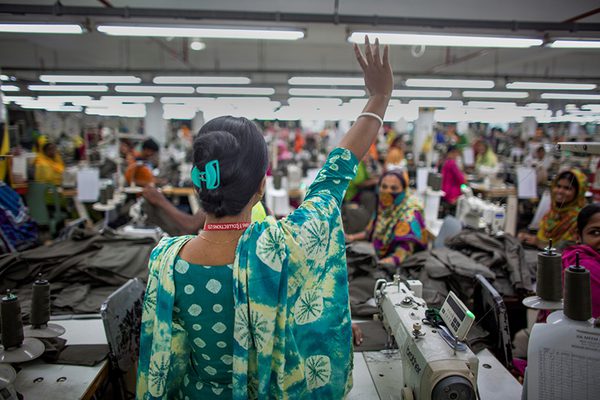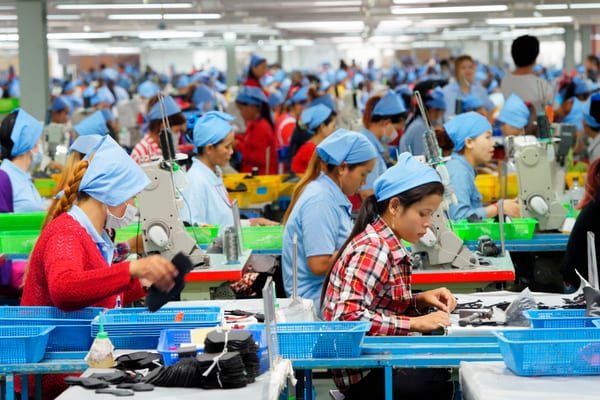Boohoo or Crocodile Tears? Worker Exploitation in a UK Apparel Factory
10 July 2020

Online clothing retailer Boohoo is the latest company to find itself on the receiving end of press reports alleging modern slavery, exploitation and abuse of factory workers in supply chains. The UK based company is contending with how to respond to serious abuses of worker rights at one of its suppliers in Leicester, in England’s East Midlands, where much of the UK apparel industry is located.
Unfortunately for the company, media exposure immediately gained more prominence due to a potential link between poor working conditions across Leicester’s apparel industry and a spike in COVID 19 that had led to lockdown restrictions remaining in the city whilst being relaxed elsewhere.
Workers in a factory supplying Boohoo were found to be working for substantially less than the UK minimum wage of £8.72 per hour, with reports as low as £3.50 being quoted in some newspapers. The shocking revelations have attracted national attention in the UK, but the hard truth is that this revelation will more than likely be quickly forgotten as just the latest in a long line of similar cases where lack of scrutiny and action by both companies and government authorities fails to detect and prevent exploitation of workers.
The hard truth is that this revelation will more than likely be quickly forgotten as just the latest in a long line of similar cases.
Specialising in online retailing, Boohoo and their other owned brands Nasty Gal and Pretty Little Thing, along with a host of imitators, command an increasing segment of the fast fashion industry. Targeted squarely at a younger, tech savvy demographic for whom the idea of a physical shop is increasingly an alien concept, these companies have blazed a profitable trail through the sector, leaving others tied to bricks and mortar floundering behind them.
Central to the online shopping experience is the ability to access vast ranges of clothes at affordable prices, next day delivery, and easy returns. The entire experience of shopping for clothes (as for many other sectors) is being transformed in the process.
Boohoo Relocated Supply Base to the UK for a Reason
Central to that shopping experience is the need for the new. To keep customers coming back and filling their online shopping carts, new products must be constantly added to the site. This insatiable desire for new products is key to the online shopping experience and success of the business model. This constant churn of products is made possible through company buying practices that seek to respond at lightning speed to customer demand – short lead times being a vital component – hence relocation of supply to the UK. These factors combined with low price points are a recipe for success with consumer demand – but as with so many things that seem a bargain, comes at a very real human cost.
The entire experience of shopping for clothes is being transformed in the process.
So how did Boohoo get caught out so badly?
Those in charge at Boohoo are not new to the industry. Similar problems across the apparel sector in Leicester are actually well documented. The company insists that the allegations are mostly unfounded and that internal investigations have not uncovered any serious breaches of operating practices. The reputational damage, however, has been done. How that impacts on sales in the long term remains to be seen, but experience suggests that the company may not suffer as a result of these practices.
The Boohoo modern slavery statement contains many elements we would wish to see from a progressive company:
- The responsibility strategy is strongly supported at executive level.
- A clear code of conduct outlines expectations of suppliers to prevent forced labour in their operations.
- Third-party independent assessment of supply chain policies and procedures has been sought, although we are not told who is involved.
- The importance of the Gangmasters and Labour Abuse Authority standards for suppliers of temporary staff is highlighted.
The fact that the Leicester revelations came as a shock to Boohoo leadership is a wake up call about the practical application of policies that look good on paper.
The fact that the Leicester revelations came as a shock to Boohoo leadership is a wake up call about the practical application of policies that look good on paper.
Within their corrective action plan process for suppliers, it will be important to learn more about typical incidents taken through that process and how they (hopefully) lead to better outcomes. Being comfortable with this level of transparency is always difficult for companies but shouldn't be - it is a sign that they are looking, have a good understanding (or are building their knowledge), and are putting appropriate policies, practices, and resources in place. Proactive engagement with trade unions also helps this process.
We’re Overlooking the Other Major Offender
Government and the local authorities too should join Boohoo in this critical analysis and corrective action. The horse meat scandal of a few years ago showed us how quickly criminal elements will take advantage of lack of effective supervision and enforcement of regulations. There is a clear duty on government bodies to effectively police and enforce workplace and labour laws. As additional incentive to do so, it should be remembered that criminality seldom exists in a vacuum. So cases such as the revelations in Leicester are often connected to a range of other issues, such as money laundering, tax evasion, and benefit fraud.
Criminal elements will take advantage of lack of effective supervision and enforcement of regulations.
The main concern in these cases is protecting workers. But lack of effective supervision also impacts law-abiding companies who stick to the rules. These businesses find themselves undercut by law-breakers. Government must provide a level playing field where companies are able to compete fairly within the law.
The Gangmasters and Labour Abuse Authority (GLAA - formerly the Gangmasters Licensing Authority) was the result of cooperation between business and trade unions. Its value to business and workers was reaffirmed by the support of the Ethical Trading Initiative and the British Retail Consortium during the consultation period for the UK Modern Slavery Act. One of the few bodies with a proven track record in deterring, preventing, and prosecuting, the GLAA remains woefully underfunded. New business models and additional pressures such as increased agency working, Brexit-induced manpower shortages, and the COVID-19 pandemic mean that such a body should become a priority for any government truly committed to preventing modern slavery.
Only by protecting worker rights can we ensure the long-term success of rights-respecting companies, kickstarting the COVID-constrained economy, and strengthening the economic vitality of towns such as Leicester.
One of the few bodies with a proven track record in deterring, preventing, and prosecuting, the GLAA remains woefully underfunded.




